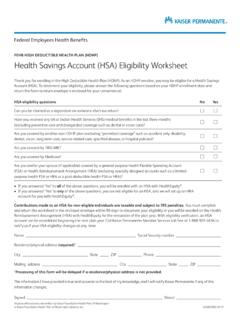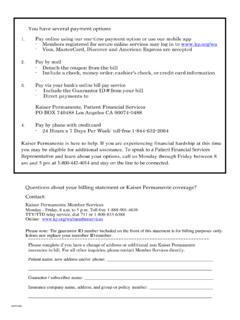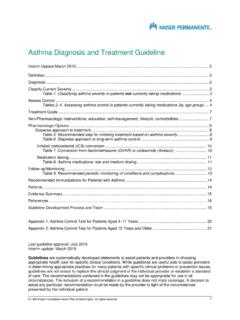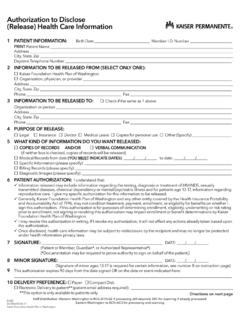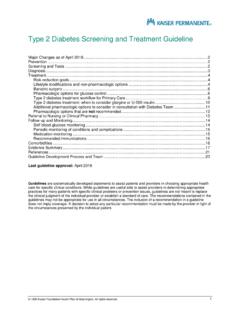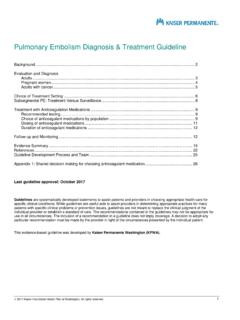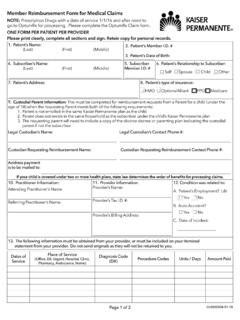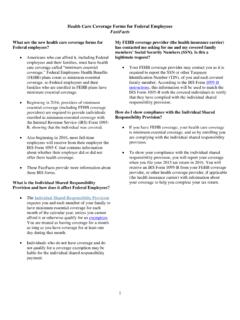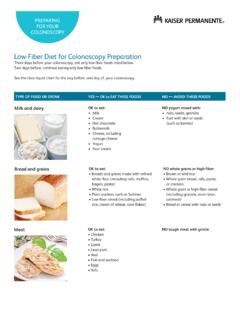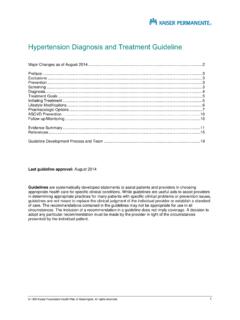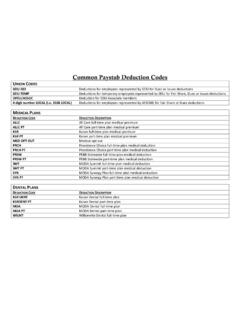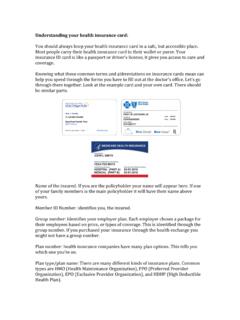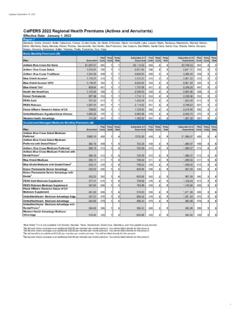Transcription of Bariatric Nutrtion and Lifestyle Plan - Kaiser Permanente
1 Updated September 2017 Obesity is a chronic disease that requires ongoing effort and permeant Lifestyle changes. Bariatric surgery is not a cure nor is it to be considered a one and done approach to treating obesity. Weight loss surgery is a simply a tool to help you achieve a healthier weight and Lifestyle . In order to have a successful long-term outcome, it is necessary to make a number of permanent Lifestyle changes. You will need to change your eating habits, behaviors, mindset, stress management strategies, and physical activity. While the nutrition plan is one of the most important parts of this journey but it is not the only component to success. Establishing healthy self-care habits is the key.
2 A journey of a thousand miles begins with a single step. ~Lao Tzu Start Now! Weight loss and optimal health is more than diet and exercise; it s an accumulation of habits that are integrated into your daily life. The Bariatric team expects you to start making small Lifestyle changes now in preparation for the surgery. Waiting for the pre op consults with the surgeon and dietitian to get started sends the message you are not committed to the process. The surgery only changes the size of your stomach; you have to do the rest to get the results you want long term. As you work through your Bariatric check list, begin to establish the healthy habits that will make you successful. The sooner you start, the more prepared you will be for the surgery, recovery, and for the rest of your life.
3 Certain things will change once you have surgery; such as food intake, separating fluids from meals, but the fundamentals are the same: healthy habits create a healthy body and life. Bariatric NUTRITION & Lifestyle plan Building a Healthy Foundation Fuel your body Kick start your metabolism by eating breakfast within 1-2 hours after waking up. Establish regular meal times throughout the day; never skipping meals or going more than 4 - 5 waking hours without eating. Eating breakfast primes your metabolism to maintain stable blood sugar levels after subsequent meals. Studies indicate prolonged fasting might lead to a bigger than normal increase in ghrelin, known as hunger hormones. This encourages you to overeat at your next meal and leading to peaks and crashes in your glucose and energy.
4 Choose protein and complex carbohydrates to get your day going. For example: cottage cheese or yogurt with berries, a protein shake and banana, veggie omelet. plan your meals We live in a high society. Restaurants and grocery stores are packed with high fat, high carb, high sugar and high salt foods. When you don t plan and prep your meals it s easy to choose the fast, higher fats/sugar/salt/carb foods when you need to eat. Create a list of different meals you enjoy for each meal. ( breakfast foods: protein and fruit smoothie, cottage cheese and fruit, or egg and veggie scramble). Having a few go to food items makes shopping and planning much easier to eat healthy and less likely to eat out.
5 Protein Protein is the cornerstone of your diet after surgery but not all proteins are created equal. High fat meats, such as pork sausage, salami, prime rib, bacon, and cheese can be substituted for leaner, healthier options: fish, chicken, lean pork, lean red meat, low-fat dairy products, eggs, and soy products. Plant-based proteins ( nuts, seeds, legumes, grains) do not contain all the essential amino acids that are found in animal based proteins. These proteins also tend to be high fat (typically healthy for your heart, but not your waistline), high carbohydrate and high calorie. Start to substitute leaner proteins for the higher fat proteins. For example: substitute chicken for beef when making tacos, eat lean ham in place of pork sausage.
6 Start to buy different protein shakes and powders to find ones you like. Drink them for breakfast or as a quick snack. Fruits & vegetables - 5+ a day Vegetables and fruits are packed full of nutrients, are low calorie and very filling. Aim for 5+ servings a day (ratio of 3 vegetables & 2 fruits). Start with 1 fruit and 1 veggie a day. Gradually increase until consistently eating 5+ servings per day. Serving sizes: o One cup of fruit or vegetable - non-starchy veggies encouraged o One piece of fruit (5 - 6 oz.) o 3 cups of leafy raw vegetables: cabbage, spinach, lettuce o cup of legumes (black beans, garbanzo beans, lentils, etc.)* Note: Legumes and beans are nutrient dense and higher calories per cup than other vegetables.
7 (Average cup: 200 - 300 calories and 10 - 20 grams of protein). o Not recommended: dried fruit or juice o Vegetables average 50 calories/cup o Fruits average 100 calories/cup or piece Fluids Getting Started: o Buy fresh, frozen and canned. Keep a variety on hand. o Fresh and frozen vegetables and fruits are more nutritious than canned but canned is still better than eating fast food. Keep a few cans of veggies you like in your pantry. o Use fresh garlic, herbs, spices and flavored vinegars to season your veggies. ( fresh ginger, curry, salt-free seasoning blends or balsamic vinegar) Aim for 64 oz. of non-caloric fluids a day; water is preferred. Post-surgery, you will be drinking sugar-free, non-carbonated, herbal beverages so start exploring options now.
8 Buy an infused water bottle. Try different combinations such as strawberries and kiwi. There are many options available; here are a few suggestions: o Try flavoring water with slice of cucumber or citrus; lemon, lime or orange. o Mio Liquid Water Enhancer (sucralose) o Sweet Drops Liquid Stevia o Water Drops (stevia) o Propel Zero or Vitamin Water Zero o Crystal Light Pure Artificial sweeteners NO NutraSweet/aspartame or Sweet & Low/saccharine products. NutraSweet, also known as Equal or the blue packet. Aspartame is in A LOT of products. For example: Crystal Light, diet soft drinks, sugar free Jell-O, puddings, popsicles, etc. Sweet & Low are the pink packets. If you are consuming products that contain aspartame, start to wean off of them and incorporating new alternatives.
9 Try using Stevia, Truvia and Monk fruit products. Try different brands and types of sweeteners to find one that you like and can tolerate. Splenda (sucralose) is okay to use and is in many of the protein shakes. Just like any other healthy habits, moderation is key. Vitamins/Supplements Start taking the vitamins and supplements daily to get into the habit. You can take tablet form of the supplement prior to surgery. For the first 2 months after surgery, liquid or chewable supplements at recommended. These vitamins & supplements are specific to the Bariatric surgery and you will be taking them for the rest of your life. Do NOT take the multivitamin with iron and calcium at the same time; separate by 2 hours.
10 Iron inhibits the absorption of calcium. DO NOT TAKE ANY supplements in gummy form. Gummies do not have all the vitamins and minerals you need, are not well absorbed & can get stuck. See Tab 7 for more information and a list of recommended vitamins and supplement brands. Vitamins/Minerals Gastric Bypass Sleeve Gastrectomy Multivitamin with iron: (chewable or liquid) 1 svg/day 1 svg/day Calcium Citrate with Vitamin D3 (chewable or liquid) 500 - 600 mg svg, 3x/day (1500 - 2000 mg day) 500 - 600 mg svg, 3x/day (1500 - 2000 mg day) Probiotic 1 svg daily 1 svg daily Vitamin B12 1 svg/day (500 micrograms) NA Food Records Start keeping food journal/records to increase your awareness of your food habits and track the health habits necessary for success.
